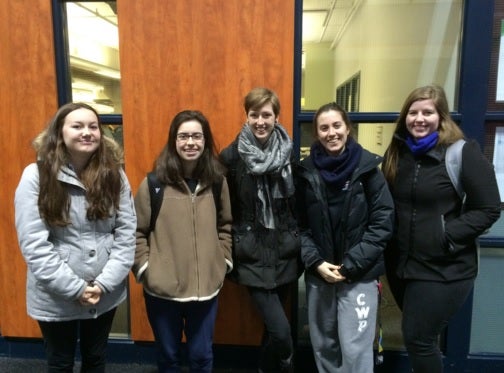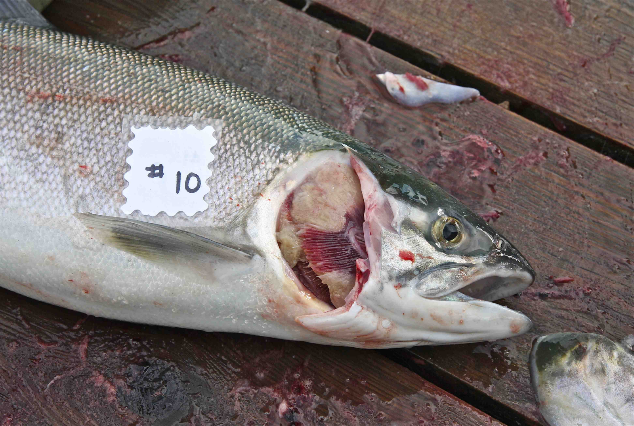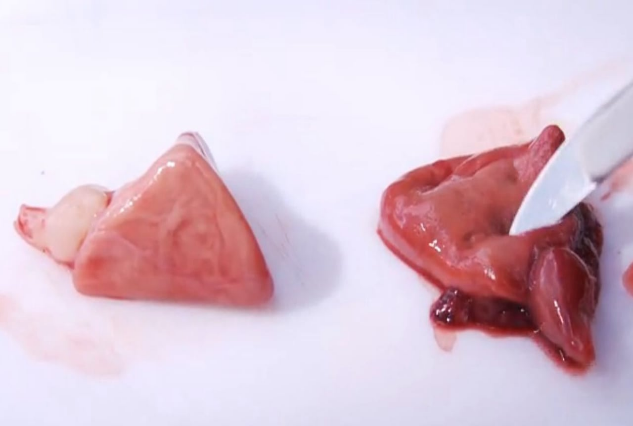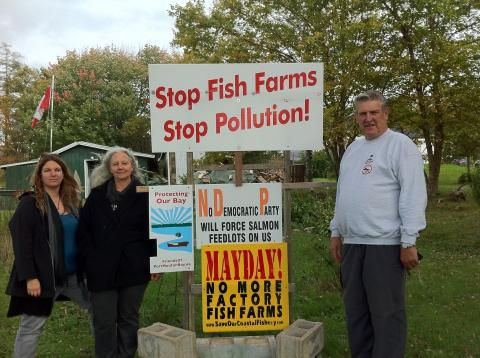
Photo from left to right: Sara Ford, Amy Warren, Elisabeth Bruins, Alexandra Clarke, Misha Goforth
Written by Sara Ford, Amy Warren, Elisabeth Bruins, Alexandra Clarke, Misha Goforth
In Canada, we have the luxury of a democratic government. We elect those who represent our values and our goals and trust that they will serve our needs as best they can. Unfortunately, many people think that is where their part in democracy ends. We vote and then we sit back and watch things unfold. Often, this results in a smooth relationship and the country functions well. A problem arises when the primary goals of a government do not align with those of their citizens. When this happens, it can lead to conflict where citizens are required to hold their government accountable. However, when citizens do not become active members of the democracy and do not demand accountability, it can lead to catastrophe.
The documentary, Salmon Confidential, exposes such a conflict between a group of scientists, who are interested in discovering and sharing the truth, and our government, who is presented as being solely interested in protecting its economic interests. This issue of water and resource governance brings light to a bigger issue of proper democratic practice.
Salmon Confidential documents the spread of salmon diseases, particularly Infectious Salmon Anemia (ISA), in B.C. salmon populations after the year 2009 when millions of salmon disappeared from Fraser river in British Columbia. Following this unexplained disappearance, Dr. Kristi Miller began investigating the widespread mortality and discovered evidence of ISA in a number of sampled fish. After presenting her findings to the Department of Fisheries and Oceans (DFO), she was ordered to hide her results and prohibited from reporting them to the public. When biologist Alexandra Morton got involved, in 2010, she too was restricted and her findings were ignored and discredited.

In November of 2009, the federal government launched an inquiry into the disappearance of the wild salmon populations. The Cohen Commission exposed many issues that had been covered up in the past. The 160-day inquiry finally allowed evidence from Dr. Kristi Miller, as well as other experts, to be shared with the public and brought light to the less than satisfactory work that had been put forth by government authorities and labs to identify and combat the problem.

The Cohen Commission agreed with the evidence brought forth by the independent scientists and held the DFO, and other authorities accountable. Many recommendations for appropriate government action were put forth in the final report of the Cohen Commission that essentially told the DFO to “get back in the business of protecting wild salmon”.

Truthfully, the only reason this issue was brought to light was due to the committed work of a few invested citizens. The Cohen Commission answered the needs and demands of the scientists only because they stepped forward to represent themselves and other affected citizens. This is how a democracy is meant to work. Sometimes, the government oversteps and, whether intentionally or not, can betray the trust they have with their people. But if there is nobody for the government to answer to, if there is no accountability, then they are largely free to do whatever they want to do.
As citizens, it may seem daunting or even impossible to go against the will of our government, but we shouldn’t underestimate the power of our consent; a government is only as strong as its citizens allow it to be. This is what true democracy is about. Citizens have the right and responsibility to stay informed and to hold their government accountable for their actions (or inaction).
Further Research and Information:
Join the Facebook group and speak out: https://www.facebook.com/SalmonConfidential/
Alexandra Morton’s blog: http://alexandramorton.typepad.com/alexandra_morton/
Further Reading:
News Articles: https://www.cbc.ca/news/canada/british-columbia/deadly-salmon-virus-may-be-in-b-c-waters-study-suggests-1.3397817
DFO Admits to ISA in BC: http://www.dfo-mpo.gc.ca/science/aah-saa/species-especes/aq-health-sante/prv-rp-eng.html
Citations
Alexandra with Anissa and Bill. Digital image. Dr Alexandra Morton's Tour of the Maritimes. The Association for the Preservation of the Eastern Shore, 2012. Web. 31 Jan. 2016. .
ISA Infected Salmon Sample. Digital image. ISAv Strain HPR5. The Department of Wild Salmon, 10 Apr. 2012. Web. 31 Jan. 2016.
Salmon Confidential. Dir. Twyla Roscovich. Prod. Salmon Is Sacred. By Twyla Roscovich. Perf. Dr. Alexandra Morton. Department of Wild Salmon, 2013. DVD.
Contact Information
Misha Goforth - mdcgofor@uwaterloo.ca
Amy Warren - arwarren@uwaterloo.ca
Sara Ford - saford@uwaterloo.ca
Elisabeth Bruins - ebruins@uwaterloo.ca
Alexandra Clarke - a23clark@uwaterloo.ca